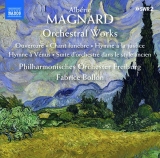 Albéric Magnard: Ouverture, op. 10 + Chant funèbre, op. 9 + Hymne à la Justice, op. 14 + Hymne à Vénus, op. 17 + Suite d'orchestre dans le style ancien, op. 2; Philharmonisches Orchester Freiburg, Fabrice Bollon; 1 CD Naxos 8.574084; Aufnahme 2017-2019, Veröffentlichung 24/04/2020 (65'30) - Rezension von Remy Franck
Albéric Magnard: Ouverture, op. 10 + Chant funèbre, op. 9 + Hymne à la Justice, op. 14 + Hymne à Vénus, op. 17 + Suite d'orchestre dans le style ancien, op. 2; Philharmonisches Orchester Freiburg, Fabrice Bollon; 1 CD Naxos 8.574084; Aufnahme 2017-2019, Veröffentlichung 24/04/2020 (65'30) - Rezension von Remy Franck
Fabrice Bollon setzt mit unvermindertem Elan seine Magnard-Einspielungen fort. Die Ouvertüre op. 10 von 1895 leitet das Programm ein. Sie ist ein schillerndes Werk voller guter Ideen, brillant konzipiert und orchestriert, das hier in einer sehr inspirierten Fassung zu hören ist.
Chant funèbre ist eine musikalische Erinnerung an Magnards Vater, den Verleger der Zeitung Le Figaro. Nachdem das Verhältnis des Komponisten zu seinem Vater zu Lebzeiten angespannt und problematisch war, war Magnard durch des Vaters Tod dennoch tief getroffen und schrieb den Chant funèbre, ein nobles und in seiner Einfachheit bewegendes Stück, das Fabrice Bollon einfühlsam gestaltet.
Für Magnard, einen eifrigen Verfechter von Alfred Dreyfus, war Gerechtigkeit ein wichtiges Gut: Davon zeugt das Stück Hymne à la Justice, das 1902 entstand, nachdem Dreyfus rehabilitiert worden war. Magnards Biograph und Freund Gaston Carraud schrieb dazu: « In der ersten Idee hören wir wiederum die bedrückende Natur der Ungerechtigkeit und einen traurigen Ruf nach Gerechtigkeit. Brutal niedergeschlagen, erhebt das Opfer den Blick auf das unerreichbare Ideal. Mit einem klagenden Schrei, der zu größerer Verfolgung führt, sieht er, wie das weiche Licht verblasst; doch gerade als die Gewalt stärker denn je zurückkehrt, bricht die Gerechtigkeit in einem triumphierenden Glanz auf. » Auch dieses Stück wird von den Freiburgern sehr gut und lebhaft gestaltet, genau wie das Loblied auf die Liebe, Hymne à Vénus (1904), das Magnard seiner Frau Julia Creton widmete.
Die Naxos-CD endet mit dem viertelstündigen Suite d’orchestre dans le style ancien, also im Stil der Tanzsuiten des 18. Jahrhunderts, die Bollon elegant und auch vital gestaltet.
Fabrice Bollon continues his Magnard recordings with undiminished vigour. The Ouverture op. 10 from 1895 introduces the programme. It is a dazzling work full of good ideas, brilliantly conceived and orchestrated, which can be heard here in a very inspired version.
Chant funèbre is a musical memory of Magnard’s father, the publisher of the newspaper Le Figaro. After the composer’s relationship with his father was tense and problematic during his lifetime, Magnard was nevertheless deeply affected by his father’s death and wrote Chant funèbre, a noble and moving piece in its simplicity, which is sensitively shaped by Fabrice Bollon.
For Magnard, a fervent supporter of Alfred Dreyfus, justice was very important: Hymne à la Justice, written in 1902, after Dreyfus’ rehabilitation, is a testimony to this. Gaston Carraud, Magnard’s friend and first biographer, described this work as follows: ‘In the first idea we hear, in turn, the oppressive nature of injustice and a sorrowing call for justice. Brutally cast down, the victim lifts his eyes towards the unattainable ideal. With a lamenting cry that leads to greater persecution, he sees the soft light fading away; but just as violence returns more powerfully than ever, justice bursts out in a triumphant blaze of glory.’ This piece is also very well and vividly played by the Freiburg Philharmonic Orchestra, just like Hymne à Vénus (1904), which Magnard dedicated to his wife Julia Creton.
The Naxos CD ends with the quarter-hour Suite d’orchestre dans le style ancien, i.e. in the style of the dance suites of the 18th century, of which Bollon gives an elegant and vital account.
























